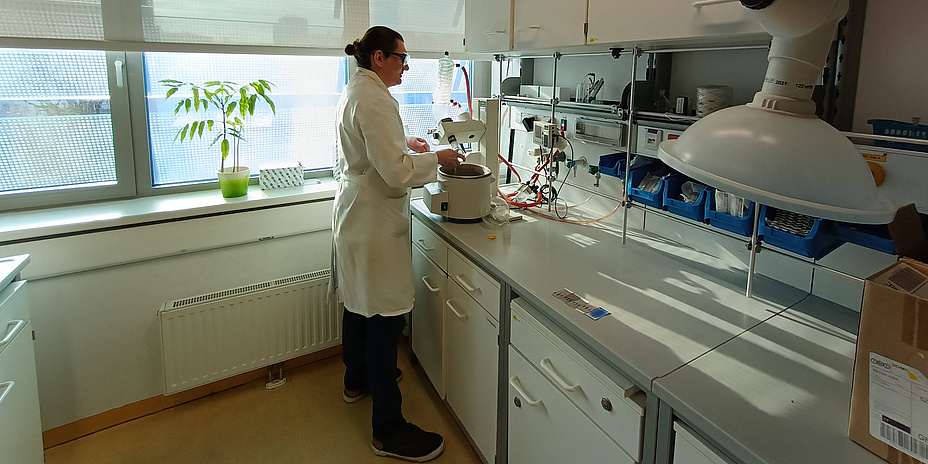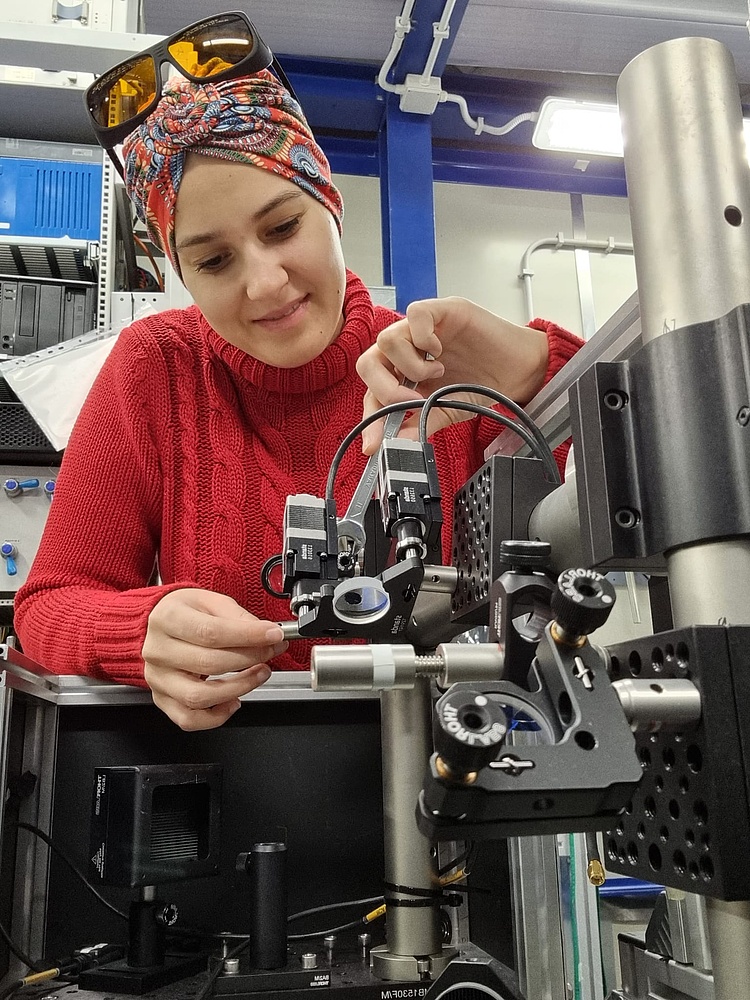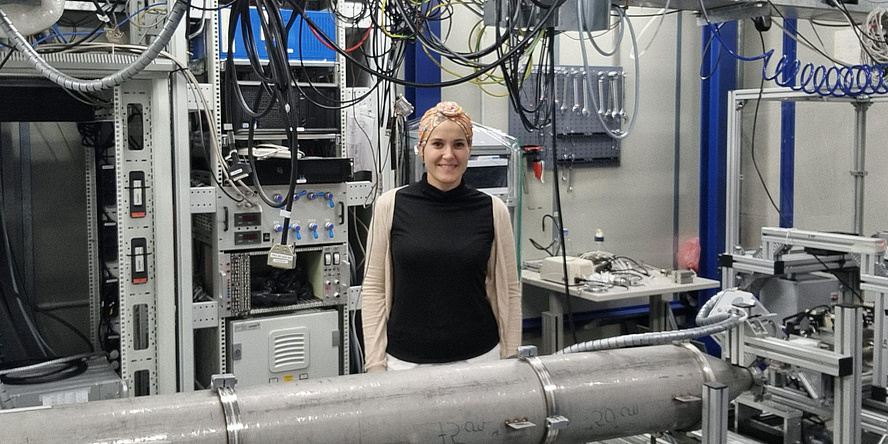So you want to understand the foundations of matter and life. You want to know why processes in nature work like this and not like that. You’re fascinated by the mixing ratio of a material, the colouring of a substance or the composition of a daily allergy tablet. All these have one thing in common: an enthusiasm for the broad field of chemistry. In this article, three chemists who took completely different career paths after their chemistry studies have their say. Sumea Klokic, post-doctoral researcher of the Central European Research Infrastructure Consortium (CERIC-ERIC) at the synchrotron in Trieste; Gabriela Luksic, product developer in research and development at Ringana; and Tobias Dorn, university assistant at the Institute of Chemistry and Technology of Biobased Systems at TU Graz. They will talk about when they first became interested in chemistry, what their biggest surprises were during their studies, how they started their careers and what they do today. Tanja Wrodnigg, Dean of Studies for the Bachelor’s degree programme in Chemistry and deputy head of the Institute at TU Graz will tell us how much of a future a career in chemistry has from her point of view and what special advantages the Graz location offers to chemistry students and science students in general.
CSI TV series, chemistry olympiads and holiday jobs: the paths to studying chemist
As a teenager, Gabriela Luksic never missed an episode of CSI Miami or CSI New York – she was hooked on forensic shows. She knew she wanted to work in a laboratory one day and analyse things like blood samples and fingernails. She applied for holiday jobs in the natural sciences via various online portals – successfully. “In my holiday job at the Institute of Analytical Chemistry at the University of Graz, I actually analysed blood samples and I loved it. It wasn’t a murder case like in CSIs (crime scene investigations), it was about fish, but I didn’t care. We were able to make a lot of statements based on very small samples, which was just fascinating,” says TU Graz graduate Luksic about her introduction to chemistry. She has remained a loyal chemistry analyst to this day. After receiving her Bachelor’s degree in Chemistry, she completed a Master’s degree in Biochemistry and Molecular Biomedicine.
TU Graz graduate Sumea Klokic has always wanted to understand processes in nature. “The answers usually lie at the level of molecules and atoms,” says Klokic with conviction. Her interest in science was sparked at secondary school, where she had the opportunity to take part in a Chemistry Olympiad in the sixth form. Nevertheless, she was hesitant to decide to study chemistry because she didn’t know anyone who had studied it. Finally, she enrolled in the Bachelor’s degree programme in Chemistry at TU Graz.
Tobias Dorn also found the decision difficult at first. Should he study chemistry? Or perhaps computer science? Ultimately, the practical aspect tipped the scales in favour of chemistry. “I wanted to spend the whole day in a laboratory rather than sitting in front of a computer,” says Dorn, explaining his decision.

Like physics, biology, maths and geography, chemistry is one of the so-called STEM subjects (known as MINT in the German-speaking area). Strictly speaking, the abbreviation MINT stands for the disciplines of mathematics, information technology, natural sciences and technology/ engineering. In Styria, the Science Garden presents exciting and varied programmes in the STEM field to children and young people as well as their parents.
Starting your studies: the many sides of chemistry
For both Gabriela Luksic and Sumea Klokic, the beginning of their time at university brought surprises and challenges. “I was surprised to realise that chemistry is not always chemistry – and yet again sometimes it is. During the degree programme, different aspects of chemistry are covered, such as organic chemistry, analytical chemistry, etc. But by the time I wrote my first project paper, I understood that these areas are interrelated and in answering certain research questions, can go beyond chemistry,” says Klokic. And not only that, you have to develop skills such as stamina and time management. Gabriela Luksic was also confronted with these issues. “Every day was packed with lectures, exercises and lab practicals. My lab partner was practically my family. I saw her every day from morning to night. I hadn’t expected that,” remembers Luksic. But there was also the exciting part: “Chemistry is so diverse and we were able to get a taste of everything and try to understand the basic principles.”
There is a lot of material to cover, especially in the first semesters of the degree programme. The teaching staff are also aware of this. “Students at TU Graz receive a lot of support from the university and the chemistry student representatives at the TU Graz Students’ Union,” says Dean of Studies Tanja Wrodnigg. “From the very first day I started studying chemistry, I was accompanied by tutorial and study groups, which made it much easier to get started and find my way around the degree programme,” confirms Klokic.
Tobias Dorn developed a particular fascination for chemical synthesis while studying for his Bachelor’s degree. He was fascinated by the possibility of creating new substances and materials that had never existed before. “Whether it’s the development of active pharmaceutical ingredients or modern materials – new ideas can almost always be realised using the theoretical and practical methods of chemistry,” says Dorn.
If you are interested, you can find information about areas of focus, admission, deadlines and career prospects on the following websites: Bachelor’s Programme in Chemistry and Master’s Programme in Chemistry (taught in English).
NAWI: Natural sciences at the University of Graz and TU Graz
If you are interested in (natural) science subjects (Naturwissenschaften in German, hence NAWI), are able to choose where to study or come from the Graz area, you are well advised to take a look at the degree programmes offered by NAWI Graz. “NAWI Graz is a unique project in the European university landscape. The two largest universities in Styria, TU Graz and the University of Graz, jointly offer Bachelor’s and Master’s degree programmes. The student-teacher ratio is extremely good. In chemistry, there is one teacher for every six students. This makes the relationship almost personal,” says Tanja Wrodnigg, Dean of Studies and deputy head of the Institute of Chemistry and Technology of Biobased Systems at TU Graz, explaining the advantages of studying chemistry in Graz. “NAWI Graz students have the great advantage of access to the teaching and research infrastructure of two universities and of getting to know the chemistry institutes and departments at both locations. They have an early opportunity to work on research projects at the participating institutes of both universities and are thus involved in research at an early stage.”
Occupations as chemist
Overcoming the initial challenges was worthwhile for all three chemistry students. Gabriela Luksic followed up her Bachelor’s degree in Chemistry with a Master’s degree in Chemistry, which she completed with the title Master of Science and “Diplom-Ingenieurin” (chartered engineer). “After a variety of holiday and part-time jobs in process engineering, packaging analysis and wine analysis, I started my career as a product developer at Ringana just a few days after completing my Master’s degree. Ringana manufactures cosmetic products and food supplements. The latter are part of my everyday life.” In addition to chemistry, Luksic also successfully completed a Master’s degree in Biochemistry and Molecular Biomedicine. According to Luksic: “when you look at biochemistry and have the analytical knowledge, the world is so much more exciting because you understand the origins of things”. And her job starts right there, at the origins. After deciding what building blocks – vitamins, minerals and plant extracts – a product needs, the next step takes place in the laboratory, where analyses are carried out on stability and behaviour. The mixture that worked in the small test tube must then be transferred to large-scale production and the final recipe created. And finally, it is necessary to work together with Marketing, where staff need to understand the product in order to be able to promote it in the outside world. “It is precisely this versatility that is so exciting, the collaboration with different departments and the development from the idea to the finished sales product,” says Luksic, describing why she loves her job so much.

Tobias Dorn realised his desire to spend more time in the lab than in front of the computer. He followed his Bachelor’s degree in Chemistry directly with a Master’s degree in Chemistry, which was still in German at the time, because “a Master’s degree in the natural sciences is now almost a prerequisite for starting a career and the Master’s degree in Chemistry suited my interests in synthesis and basic research”. He wrote his Master’s thesis at the then newly founded Institute of Chemistry and Technology of Biobased Systems at TU Graz, where he was subsequently able to take up the position of university assistant and start his doctoral studies straight away. He spends most of his working day in the chemistry laboratory carrying out experiments. Dorn conducts basic research into the modification of carbohydrates with the aim of specifically altering their biological effect. “The process of planning an experiment or a synthesis route and then the practical implementation and analysis is always a new challenge involving surprises and discoveries – both positive and negative – which makes every day exciting.” In ten years, he wants to have either built up a career in research or to be working in the chemical industry, for example as a laboratory head.

Sumea Klokic built on her Bachelor’s degree in Chemistry by studying for a Master’s degree in Technical Chemistry (taught in English) at TU Graz and then wrote her doctoral thesis in the field of inorganic chemistry. Today, she works as a post-doc, i.e. a post-doctoral researcher, answering exciting research questions at the Austrian facility of CERIC-ERIC, a multidisciplinary research infrastructure consortium which is based at both TU Graz and Elettra Sincrotrone Trieste. “I would like to stay in research in order to answer fundamental questions that could be important for everyday life in the future,” says Klokic, with an eye on the future.
How popular is chemistry?
As for future job prospects in chemistry, Dean of Studies Wrodnigg gives a clear answer: “Chemistry is present in every area of life”. The areas in which chemists are employed are correspondingly diverse. “They are needed in food production and food quality assurance, in the development of pharmaceutical products to combat cancer, bacterial infections, diabetes, Parkinson’s and Alzheimer’s, or for the production of new smart materials and technologies based on renewable raw materials, to name just a few areas. The climate crisis can only be overcome with the help of chemists,” says Wrodnigg confidently.
Chemists are needed in food production and food quality assurance, in the development of pharmaceutical products to combat cancer, bacterial infections, diabetes, Parkinson’s and Alzheimer’s, or for the production of new smart materials and technologies based on renewable raw materials, to name just a few areas.
“Students at TU Graz benefit from numerous collaborations with industrial companies such as Anton Paar, Borealis, Baumit, Andritz Hydro, Mondi, AT&S AVL, ams AG, Continental, BMW, AGRANA GmbH and HILFI when starting their careers,” says Wrodnigg. As part of cooperation projects and when writing Master’s theses for industry partners, they gain practical experience during their studies and can establish contacts with potential employers.
In general, Wrodnigg sees the best career prospects in the pharmaceutical industry, battery research in the battery industry, and energy research in the energy industry and, last but not least, in institutions that develop strategies to combat climate change.
Occupational fields that are open to chemists:
- Research and teaching at universities and institutes
- Industrial research and development in pharmaceutical and chemical companies
- Quality assurance and control, process monitoring
- Public administration in chemical, environmental or medical fields (e.g. in risk assessment, chemical safety and immission control)
- Product management
- Chemical analysis, medical and environmental diagnostics (e.g. in industry, hospitals and authorities)
- Management of research laboratories in pharmaceutical and chemical companies
- Battery research
- Patents (national or international organisations and companies)
- Food industry
- Pulp and paper industry
- Battery and semiconductor industry

